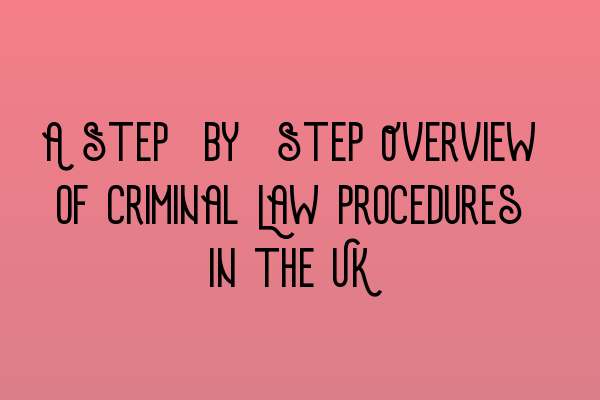A Step-by-Step Overview of Criminal Law Procedures in the UK
Welcome to SQE Criminal Law & Practice Law UK! As expert solicitors specializing in criminal law, we understand the importance of being well-versed in the criminal law procedures followed in the UK. Whether you are a law student, a legal professional, or simply someone interested in understanding the criminal justice system, this comprehensive guide will provide you with a step-by-step overview of criminal law procedures in the UK.
1. Investigation Stage
The criminal law procedures in the UK begin with the investigation stage. This is when law enforcement agencies such as the police gather evidence to establish whether a crime has been committed and to identify the potential suspects. During this stage, various investigatory techniques are used, including witness interviews, forensic analysis, and surveillance. If you are interested in criminal law investigations, we recommend checking out our SQE 1 Practice Exam Questions to test your knowledge.
2. Arrest and Detention
Once the police have gathered sufficient evidence and identified a suspect, they have the power to arrest and detain the suspect. The criminal procedure rules in the UK ensure that the arrest and detention are conducted in accordance with the law. Understanding these rules is crucial for any aspiring criminal lawyer. If you are preparing for the SQE exams, we suggest you take a look at our SQE 1 Practice Mocks FLK1 FLK2 to enhance your knowledge.
3. Bail or Remand
After the arrest, the suspect may be granted bail or remanded in custody. Bail is granted when the court believes that the suspect will attend future court hearings without posing a risk to the public. On the other hand, remand is ordered when the court believes that the suspect may abscond or pose a risk. Understanding the factors influencing the court’s decision on bail or remand is crucial, and our SQE 2 Preparation Courses can help you brush up on this aspect of criminal law.
4. Charging and First Court Appearance
Once the police have completed their investigation, they will submit the evidence to the Crown Prosecution Service (CPS) for a charging decision. If the CPS determines that there is sufficient evidence to prosecute, they will formally charge the suspect with the relevant criminal offenses. The suspect will then appear in court for their first court hearing, where they can enter a plea of guilty or not guilty. For more information on court appearances and pleading, our SQE 1 Preparation Courses cover these topics in detail.
5. Disclosure and Case Preparation
After the first court appearance, both the prosecution and defense have a duty to disclose all relevant evidence to each other. This ensures transparency and fairness in the proceedings. Lawyers play a crucial role in the case preparation stage, where they analyze the evidence, interview witnesses, and develop their legal arguments. Our team of expert solicitors has extensive experience in case preparation, ensuring that we are well-equipped to handle any criminal case.
6. Trial
If the case proceeds to trial, the prosecution and defense will present their arguments and evidence before a judge and, in some cases, a jury. The trial process involves examination and cross-examination of witnesses, presentation of documentary evidence, and legal submissions. It is during the trial that the guilt or innocence of the accused is determined. As the leading criminal law specialists in the UK, we have significant experience in representing clients in trial proceedings and achieving successful outcomes.
7. Sentencing and Appeals
If the accused is found guilty, they will proceed to the sentencing stage. Sentencing varies depending on the severity of the offense, the circumstances of the case, and any mitigating factors. The court has the power to impose fines, community orders, custodial sentences, or other appropriate penalties. If the accused is dissatisfied with the verdict or the sentence, they have the right to appeal the decision. Our team at SQE Criminal Law & Practice Law UK can provide expert guidance and representation throughout the appeals process.
These seven steps provide an overview of the criminal law procedures followed in the UK. If you are considering a career in criminal law or simply interested in learning more, our team at SQE Criminal Law & Practice Law UK is here to support you. Feel free to browse our website for more information on our services and don’t forget to check the SRA SQE Exam Dates if you are planning to take the SQE exams.
Thank you for reading our step-by-step overview of criminal law procedures in the UK. We hope you found this guide informative and useful. If you have any further questions or would like to discuss your specific legal needs, please do not hesitate to contact us. Our expert solicitors are ready to assist you.
